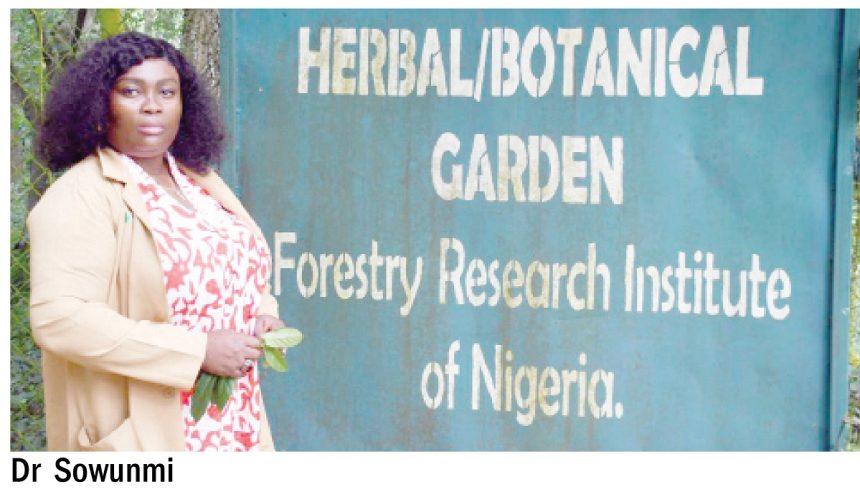AS the world marks African Traditional Medicine Day, a day dedicated to acknowledging and honouring the integral role of traditional medicine in the health and welfare of generations across the continent. The Bio-medicinal Centre of the Forestry Research Institute of Nigeria calls for strengthened research and practice with an emphasis on the need for sustained investment in practitioners’ education and locally led research to promote traditional medicine.
Speaking on the commemoration of African Traditional Medicine Day, Zacharia B. Yaduma (Ph.D), the Director General of the Forestry Research Institute of Nigeria, urged citizens to support initiatives that promote training and evidence-based research in traditional medicine, conservation efforts that secure medicinal resources for future generations, and policies that bring science and tradition into productive dialogue.

According to Dr Linda Ifeanyi chukwu Sowunmi, the Acting Director, Bio-medicinal Research Centre, Forestry Research Institute of Nigeria (FRIN), “an estimated 80% in the developing regions rely on traditional medicine for basic health care needs”. This underscores the importance of equipping traditional health practitioners with the knowledge, skills and evidence base required to deliver safe and effective care. “The continued prominence of herbal remedies and indigenous therapies in our communities is hardly surprising, given their deep roots in our culture and tradition,” Dr Sowunmi said.
However, the Research Prowess laments that many practitioners face persistent challenges, including lack of formal training, limited access to up-to-date information and resources, and few opportunities for mentorship. She expresses concern that these gaps can produce inconsistent quality of care and legitimate safety concerns.
Addressing these gaps, the Acting Director of the Bio-medicinal Centre, FRIN, said requires sustained capacity building that brings together practical training in herbal preparation and dosage, patient care and communication, infection control and safety, research methods and ethics and business management to support viable, sustainable practice.
She appealed for institutional support, citing the efforts of the Bio-medicinal Research Centre of FRIN in conducting research and documentation on medicinal plants, conserving medicinal-plant biodiversity, preserving resources essential for traditional medicine, investigating diverse species and their bioactive components to clarify benefits and limitations for human use, supporting the development of new herbal products and therapies, and collaborating with practitioners on sustainable harvesting and cultivation.
Dr Sowunmi explained further that “the centre generates scientific evidence that contributes to policy decisions aimed at regulating and standardising the sector while safeguarding natural resources”. She highlighted the importance of regulatory bodies such as the Standard Organization of Nigeria (SON) and the National Agency for Food and Drug Administration and Control (NAFDAC) in ensuring the quality and safety of herbal medicines. She opined that “when research, education and innovation are aligned, the benefits are broad – improved health care outcomes, greater access to culturally appropriate care, and preservation of traditional knowledge, economic empowerment and the promotion of cultural heritage.”
The Acting Director, Bio-medicinal Research Centre, FRIN, is a passionate ethnobotanist whose research bridges traditional knowledge and modern science to address pressing issues of nutrition, health and food security. Dr Linda Sowunmi holds a PhD in ethnobotany from the University of Fort Hare, South Africa, in 2016. As part of her PhD, she conducted an in-depth exploration into the nutritional composition and domestication of a wild vegetable with notable therapeutic potentials. Her work not only highlights the untapped value of indigenous plant resources but also contributes significantly to the sustainable development of food systems in her region. Linda’s research embodies a commitment to harnessing local biodiversity for global challenges, positioning her as a rising voice in the field of ethnobotany and food security.
Dr Sowunmi reiterated that research is the backbone of advancement in traditional medicine and maintained that “rigorous phytochemical, pharmacological, toxicological and clinical studies can improve the safety and efficacy profiles of herbal products, develop novel treatments on drug leads, create pathways for evidence-based integration into national health systems and support protection of intellectual property rights to encourage local innovations.”
The Director General of the Forestry Research Institute of Nigeria, Zacharia B. Yaduma (Ph.D), summed up by saying that through collective effort, traditional medicine can continue to serve communities safely and effectively while contributing to health-system resilience and socio-economic opportunity.
READ ALSO: FG unveils roadmap to standardise traditional medicine
WATCH TOP VIDEOS FROM NIGERIAN TRIBUNE TV